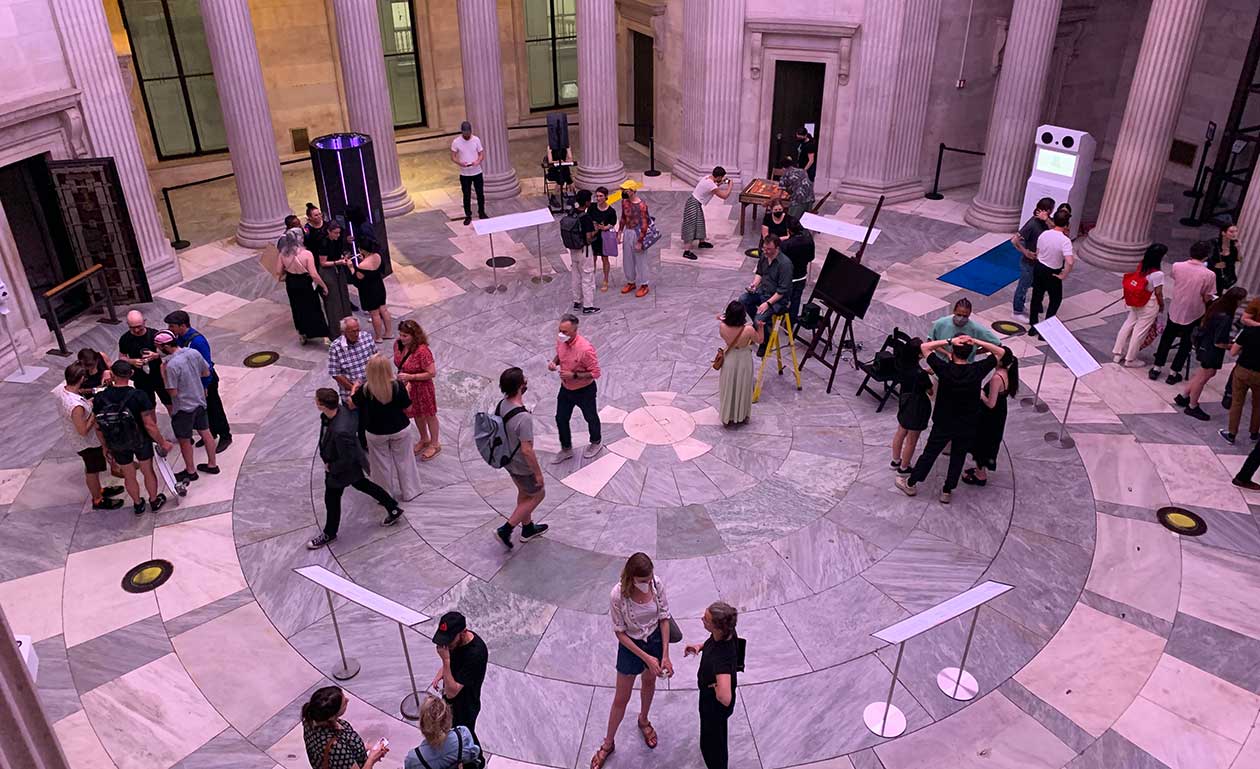
Photo courtesy of The Frank-Ratchye Studio for Creative Inquiry
Now on View at Federal Hall
July 4 - August 30, 2022
15 Pine Street, NYC NY 10005
Federal Hall National Memorial will commemorate the 230th anniversary of the Bill of Rights in an unexpected way: with an exhibition of games. “Shall Make, Shall Be: The Bill of Rights at Play'' will open in Federal Hall’s Grand Rotunda July 4, 2022 and remain through August 31. To stay informed, please join our mailing list.
“Human rights may be guaranteed by law, but one’s humanity is never a given.”
―Sarah Kendzior, The View from Flyover Country: Dispatches from the Forgotten America
Shall Make, Shall Be: The Bill of Rights at Play is a curatorial project that invited independent artists and game designers to create playable artworks themed around the individual amendments in the Bill of Rights, drawing on their effects, interpretations, and legal meanings in US culture. These works are meant to be understood as critical games, using the mechanisms of play to interrogate, critique, and inform our understanding of civil liberties in the twenty-first century.
Artists are obvious stakeholders in the First Amendment, alongside journalists, activists, and anyone else who sees the phrase “a more perfect union” as a call to action rather than a statement of fact. Our social discourse is openly political: we engage in satire, activism, participation, critique, and demagoguery, sometimes all in a single conversation. The ability for an individual in the United States to exercise their right to impugn the government is something that we frequently take for granted, and we easily forget that there are plenty of countries where this can get you fined, arrested, incarcerated, or killed. Most Americans, rightly, find such violence disturbing, but even more disturbing is the increasing number of Americans who don’t seem to have a problem with it.
The Bill of Rights as a focal point certainly makes lots of sense these days, given the frequency with which rights contained within come up in the lives of those in and around the United States. But games, play, and interactive artworks about the Bill of Rights? Not as obvious, perhaps, but definitely a timely way for reexamining and reconsidering the spectrum of rights articulated, interpreted, enacted, clung to, refuted, and otherwise swirling inside and giving structure to the American experiment. Indeed, games have overtaken the global film industry and also broken through to “serious” credibility as a mode of critical and contemporary art practice.
Shall Make, Shall Be provides ten interpretations through which we can play with these ideas. The games and interactive artworks in this exhibition come from clear points of view and open up lines of thinking about the meaning and implications of the framework we use to articulate the rights of citizens. One way to think of games is as playable systems. Not unlike life itself, gameplay shows us how our laws, cultural norms, and lived experiences don’t always lead to the outcomes we may envision.
This has been our goal and hope for the Shall Make, Shall Be project: to share ten works that give us a space to consider the underlying foundations of the American experiment and the identity and life these ten amendments created. On this site, and in the forthcoming catalogue (spring 2023), you will find five elements for each amendment: the verbatim text of each amendment; an elucidating essay by a constitutional expert on the amendment’s contemporary relevance; our curators’ notes on the work created about the amendment; the artists’ own thoughts on what concepts and principles inspired their project; and documentation of the work itself. We believe these works help us see new paths forward toward a chance at life, liberty, and the pursuit of happiness.
FOR MORE INFORMATION
For more information on Shall Make, Shall Be, please fill out this form, or reach out to the individuals below.
Federal Hall: Renee Barnes, rbarnes@nyharborparks.org
New York University: Karl Greenberg, karl.greenberg@nyu.edu
The New School: Will Wilbur, wilburw@newschool.edu
Carnegie Mellon University: Golan Levin, golan@andrew.cmu.edu
1
Freedom of Religion, Speech, Press, Assembly, Petition
Congress shall make no law respecting an establishment of religion, or prohibiting the free exercise thereof; or abridging the freedom of speech, or of the press; or the right of the people peaceably to assemble, and to petition the Government for a redress of grievances.
2
The Right to Bear Arms
A well regulated Militia, being necessary to the security of a free State, the right of the people to keep and bear Arms, shall not be infringed.
3
The Housing of Soldiers
No Soldier shall, in time of peace be quartered in any house, without the consent of the Owner, nor in time of war, but in a manner to be prescribed by law.
4
Unreasonable Search and Seizure, Warrants, Probable Cause
The right of the people to be secure in their persons, houses, papers, and effects, against unreasonable searches and seizures, shall not be violated, and no Warrants shall issue, but upon probable cause, supported by Oath or affirmation, and particularly describing the place to be searched, and the persons or things to be seized.
5
Due Process, Self-Incrimination, Eminent Domain
No person shall be held to answer for a capital, or otherwise infamous crime, unless on a presentment or indictment of a Grand Jury, except in cases arising in the land or naval forces, or in the Militia, when in actual service in time of War or public danger; nor shall any person be subject for the same offence to be twice put in jeopardy of life or limb; nor shall be compelled in any criminal case to be a witness against himself, nor be deprived of life, liberty, or property, without due process of law; nor shall private property be taken for public use, without just compensation.
6
Rights of Defendents in Criminal Trial
In all criminal prosecutions, the accused shall enjoy the right to a speedy and public trial, by an impartial jury of the State and district wherein the crime shall have been committed, which district shall have been previously ascertained by law, and to be informed of the nature and cause of the accusation; to be confronted with the witnesses against him; to have compulsory process for obtaining witnesses in his favor, and to have the Assistance of Counsel for his defense.
7
Rights in Civil Cases
In suits at common law, where the value in controversy shall exceed twenty dollars, the right of trial by jury shall be preserved, and no fact tried by a jury, shall be otherwise re-examined in any court of the United States, than according to the rules of the common law.
8
Excessive Bails, Fines, or Punishment
Excessive bail shall not be required, nor excessive fines imposed, nor cruel and unusual punishments inflicted.
9
Additional Fundamental Rights of People
The enumeration in the Constitution, of certain rights, shall not be construed to deny or disparage others retained by the people.
10
Separation of Powers and Federalism
The powers not delegated to the United States by the Constitution, nor prohibited by it to the States, are reserved to the States respectively, or to the people.





